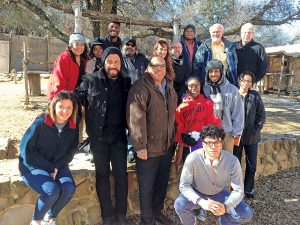For many, finding a job you love can be difficult. Often, passion and profession are kept a healthy distance from each other, but people like Richard Polite have not only found a way to do what they love, but also inspire others to do the same.
Mr. Polite is a professional filmmaker specializing in Christian films, also known as redemptive films. He has produced and directed two feature films, “Standing in the Gap,” in 1991, and “Heart of Stone,” in 1994, as well as 12 professional music videos. The 30-year veteran of the studio credits “Heart of Stone” for launching his career, after it found success among urban Christian groups. “It really spurred me on to continue doing this business … for God’s glory,” he shares.
Mr. Polite is also the founder and managing director of the Transformation Film Institute (TFI), a Frisco-based, nonprofit film school that teaches students how to create redemptive films. Students who wish to enroll in a full-time program can sign up for the Fast Track Professional year-long program spanning three semesters. It culminates in a week on-site at Capernaum Village, a set of three film backlots that TFI and their partner, Tammy Lane Productions, provide for students to create their own short films. “We are kind of like a Sundance school for Christians,” Mr. Polite shares.
TFI’s mission is to “pass on both the insight and the technique necessary to make a quality film or television show from start to finish,” a principle Mr. Polite embodies. In founding and working with TFI, he combines his passions in filmmaking and teaching with his love of community and Christianity to help guide students in learning to create redemptive films. “You can separate your faith from what you do, but I did not want to and did not have to,” he shares.
Faith and the community around it has always been a part of Mr. Polite’s life. Born in 1957, in the 7th Ward of New Orleans, he was raised in a devout Catholic household. He attended Catholic schools growing up and even served as an altar boy for some time.
As he grew older, however, his priorities began to shift. With his arrival at Xavier University of Louisiana in New Orleans, Mr. Polite discovered his love of film and became more career-driven, compartmentalizing his faith and spending more time working on honing his budding love for film.
While at Xavier, he began taking photography classes and found he was good at shooting photos. He was good enough, he says, to be offered a spot on his cousin’s public affairs television show on Channel 8, where his segment on community affairs found success among viewers.
Around this time, Mr. Polite met his wife, Tina, while studying theatre. The pair began a relationship, and about two years later, they were married.
Though he found success, Mr. Polite recalls this time of his life as tumultuous. He lived in the moment and found himself entirely too focused on worldly things. He called himself, perhaps too harshly, “bad as heck.” He shares, “Everything in my life was temporary.”
At 24 years old, he went through what he calls his “born again experience” … a kind of spiritual rebirth within Christianity often described as coming to know Jesus Christ personally.
He attended church with a co-worker who had recently become born again, and was convinced the man had the wrong idea or that something bad had happened to him. He joined his co-worker for church that night at the Philadelphia Church in New Orleans, sure he would be proven correct. “I remember telling him, ‘Man, this is a cult!’ before we walked in there,” Mr. Polite shares.
However, Mr. Polite had an amazing experience while sitting in the church that night. As he listened to the choir sing and joined the preacher at the altar, he felt as though a burden had been lifted from his shoulders. “I felt forgiven. I felt the newness of Christ hit me,” he says.
On his way home from the church that night, Mr. Polite recalls adding an extra two blocks onto his walk so he could have extra time to pray. “I wanted to ask God ‘what is going on here?’” he says.
 When he returned home, his wife seemed almost concerned when she opened the door. “What did they do to you? You seem bright,’” she said to him. He told her about his experience at the church, and two weeks later, Mrs. Polite and her grandmother attended the same church and found themselves agreeing with Mr. Polite. “I think she saw how my life was changing and wanted a piece of it. She never told me for sure, though,” Mr. Polite says.
When he returned home, his wife seemed almost concerned when she opened the door. “What did they do to you? You seem bright,’” she said to him. He told her about his experience at the church, and two weeks later, Mrs. Polite and her grandmother attended the same church and found themselves agreeing with Mr. Polite. “I think she saw how my life was changing and wanted a piece of it. She never told me for sure, though,” Mr. Polite says.
Mrs. Polite recalls a slight but noticeable change in her husband’s personality. She recalls him becoming more introspective and more concerned about his actions. “He was struggling with himself, but in a good way. I had never seen that side of him,” she shares.
Shortly after that night at church, Mr. Polite graduated from Xavier with a bachelor’s degree in theatre communications and took a job with Cox® Cable New Orleans. After only six months, he rose from cameraman to director, responsible for locally-produced shows like “Music City.” His work at Cox Cable, as well as producing several stage plays on the side, inspired him to become a professional filmmaker. He set out for Regent University in West Virginia and received his master’s in film communication after a few short years. While attending, he worked as a producer for the Christian Broadcast Network (CBN), now known as the Family Channel, but was unfortunately laid off when CBN encountered financial difficulty.
He and his family of four, with children Joshua and Ryan, briefly moved to Detroit to pursue another producer job before moving back to New Orleans. While back in his hometown, a friend approached him with a redemptive stage play he had written titled “Standing in the Gap” and expressed his desire to make it into a short film. Mr. Polite agreed to the project, and after rewriting the play for the screen, traveled to Brooklyn, N.Y. and shot the film in one week.
“Standing in the Gap” saw success within urban Christian circles, which inspired Mr. Polite to begin work on his own original redemptive film, “Heart of Stone,” which was heavily inspired by his own experiences growing up in the 7th Ward of New Orleans. The film achieved a cult following similar to “Standing in the Gap,” as well as selling 20,000 presale copies to distributors. Mr. Polite credits the film’s success for launching the rest of his career, including a role as a producer for Bishop T.D. Jakes, a Pentecostal televangelist based in Dallas, who brought the Polite family to Frisco.
Today, Mr. Polite spends his days operating TFI. He plans to return to filmmaking with the launch of Screen Harvest, a production company under TFI, and its inaugural film currently titled “The Breaking Point.” His goal is to use Screen Harvest to see as many redemptive films produced as he can. He hopes to put out at least one to two films per year under the label. “We tell all our students ‘let this be your pulpit.’ I want all of us to labor in the field of the screen together,” he says.
Bailey Herring is a writer, dog-lover and student at the University of North Texas.


